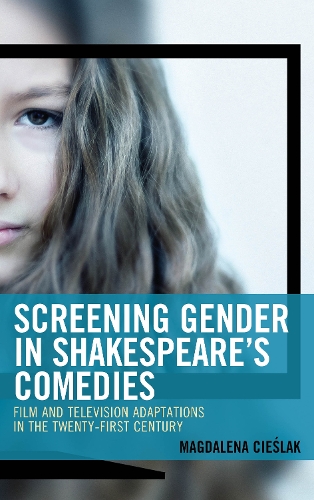
Screening Gender in Shakespeare's Comedies: Film and Television Adaptations in the Twenty-First Century
(Paperback)
Available Formats
Publishing Details
Screening Gender in Shakespeare's Comedies: Film and Television Adaptations in the Twenty-First Century
By (Author) Magdalena Cieslak
Bloomsbury Publishing PLC
Lexington Books
2nd July 2021
United States
Classifications
Professional and Scholarly
Non Fiction
Gender studies, gender groups
Literary studies: plays and playwrights
Media studies
Popular culture
791.43617
Physical Properties
Paperback
294
Width 153mm, Height 219mm, Spine 21mm
426g
Description
When adapting Shakespeare's comedies, cinema and television have to address the differences and incompatibilities between early modern gender constructs and contemporary cultural, social, and political contexts. Screening Gender in Shakespeares Comedies: Film and Television Adaptations in the Twenty-First Century analyzes methods employed by cinema and television in approaching those aspects of Shakespeare's comedies, indicating a range of ways in which adaptations made in the twenty-first century approach the problems of cultural and social normativity, gender politics, stereotypes of femininity and masculinity, the dynamic of power relations between men and women, and social roles of men and women. This book discusses both mainstream cinematic productions, such as Michael Radford's The Merchant of Venice or Julie Taymor's The Tempest, and more low-key adaptations, such as Kenneth Branagh's As You Like It and Joss Whedon's Much Ado About Nothing, as well as the three comedies of BBC ShakespeaRe-Told miniseries: Much Ado About Nothing, The Taming of the Shrew, and A Midsummer Night's Dream.
This book examines how the analyzed films deal with elements of Shakespeare's comedies that appear subversive, challenging, or offensive to today's culture, and how they interpret or update gender issues to reconcile Shakespeare with contemporary cultural norms. By exploring tensions and negotiations between early modern and present-day gender politics, the book defines the prevailing attitudes of recent adaptations in relation to those issues, and identifies the most popular strategies of accommodating early modern constructs for contemporary audiences.
Reviews
The field of academic research on Shakespeare and screen adaptations has been rapidly expanding over the past decades, and Cielaks interdisciplinary study provides a welcome critical addition. . . In a highly topical book, also considering the ongoing #MeToo debate, the author explores the tensions and negotiations between early modern attitudes towards gender and the way twenty-first century adaptations relate to those issues in terms of current gender politics. . . . With all the insightful analysis in her timely book, Cielak has hopefully also provided an impetus for further research in this highly topical field.
* Sederi Yearbook *Magdalena Cieslaks Screening Gender offers insightful readings of Shakespeares romantic comedies and their representation in twenty-first-century film. In a comprehensive survey, she identifies the early modern constructions of gender, marriage, and female sexuality embedded in Shakespeares texts and illuminates the ways they are replicated and sometimes interrogated in cinematic adaptations. -- Virginia Mason Vaughan, Clark University
Author Bio
Magdalena Cielak is assistant professor of English at the University of d.
